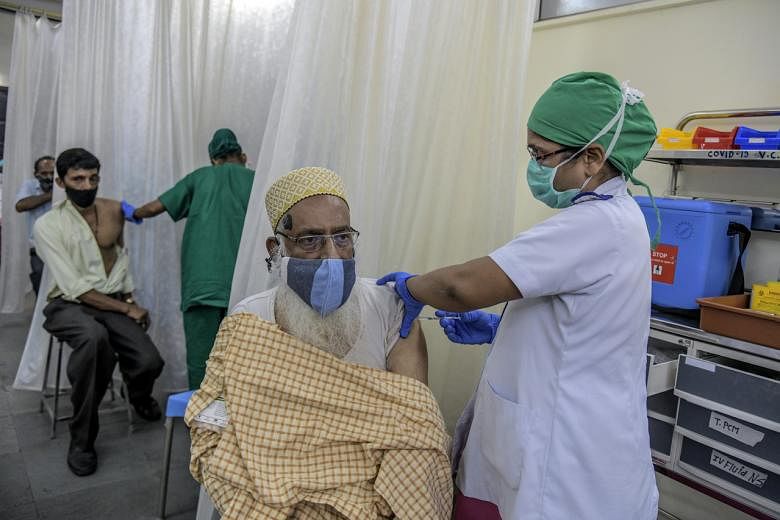BANGALORE - Days before India expands its vaccination drive to people between the ages of 18 and 45, a debate has erupted over the high price fixed for citizens to pay and if it will adversely impact national immunity.
In the grip of a second wave of the Covid-19 pandemic, India recorded over 350,000 cases on Sunday (April 25), taking total infections to more than 17.3 million. As the coronavirus rips through the country, herd immunity has become urgent.
But the central government has announced that "vaccines will not be free of cost" for those between 18 and 45 years old who are eligible to be vaccinated from Saturday. The only two approved vaccine manufacturers in the country have now set rates per dose that are higher than those meant for export to the European Union and Britain.
India has been vaccinating health workers since January and those above 45 years old since March, with the central government procuring the vaccines at 150 rupees (S$2.67) from the manufacturers and allotting it to all states. Select private hospitals were allowed to charge people 250 rupees per dose.
Less than 2 per cent of the population have now received both doses. At least 70 per cent of adults have to be vaccinated to achieve herd immunity: that is 654 million people for India.
For the rest of the adult population below 45, the government under Prime Minister Narendra Modi has decided to decentralise vaccine purchase and distribution. It will now buy only half the vaccines from the manufacturers, and state governments will have to foot the bill for the rest, sharing their quota with private hospitals.
Last week, the Serum Institute of India (SII) that makes the AstraZeneca-Oxford University vaccine called Covishield announced that it will charge US$5 (S$6.63) per dose for state governments and US$8 for private hospitals.
Bharat Biotech has priced its indigenous Covaxin even higher, at US$8 for state governments and US$16 for private hospitals, which in turn may charge citizens even higher prices, citing tax and transportation costs.
In short, 28 state governments will foot the bill at one rate and private hospitals will buy directly from the vaccine makers at a higher rate.
Both companies said in press statements that without the central government making confirmed advance purchases of the vaccine, these prices were the only way they could expand production.
Most countries, including the United States, France, Germany, China and Singapore, are vaccinating their citizens free of charge. India, the second-worst affected country in the pandemic, is among the few that are getting their citizens to pay for the jab.
Health minister Harsh Vardhan justified this approach as giving "flexibility to the states" who can directly purchase and negotiate prices. Some states like Karnataka, Maharashtra, Tamil Nadu, Kerala, and Assam have already committed to offering the jab for free at its state-run centres.
"The balance 50 per cent quota is also open for corporate and private sector to pool in their resources so that the combined effort of Team India can be deployed to vaccinate every adult in the earliest possible time," Dr Vardhan added in a four-page written statement which dismissed criticism and called for "shared idealism".
But public health experts, eminent personalities and opposition parties decry the strategy as unethical "differential pricing" that will lead to skewed supply and uneven vaccination across the population that will eventually not arrest the surge in infections.
"With every state individually contacting the suppliers and bargaining price and supply, the discretion will be with the supplier - who to sell to, when, where, how much and at what rate," former Indian health secretary Sujatha Rao wrote in The Indian Express.

"This will undoubtedly create interstate inequities, where the poorer states will stand to suffer due to poor bargaining power, while the better-off may end up paying higher rates but at the cost of sacrificing an already underfunded welfare programme," she added.
In India's last Consumer Expenditure Survey, monthly per capita consumption expenditure of an average Indian was 1,872 rupees in rural areas and 3,859 rupees in urban areas.
The vaccine price is thus not affordable for most Indians - a family of five will have to fork out sums ranging from 4,000 rupees to as much as 12,000 rupees to receive both doses.
"It will push and exclude millions of poor people in India from accessing this health measure", thus defeating the crucial aim of achieving universal immunity, said Mr R. Ramakumar, an economist and professor in the School of Development Studies at the Tata Institute of Social Sciences.
India's finance minister allotted 350 billion rupees for vaccination on Feb 1 and Mr Ramakumar has questioned the purpose of this funding, if not for vaccines for citizens or to pay manufacturers to increase capacity.
Both SII and Bharat Biotech are currently far short of their production commitments, threatening plans to vaccinate everyone.
"With limited supply, there is a danger of a black market emerging in these vaccines, as has been the case with oxygen cylinders and medicines," said Mr Vivek Kaul, a commentator on economic affairs.
The supply crunch may ease when Russia's Sputnik V is available from Saturday. Russia has signed deals with five Indian manufacturers for 850 million doses a year, but it is unclear how much of this will be for the Indian domestic market and at what price.












